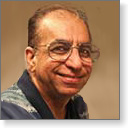| Allergies: Personal stories |
Wayne, age 50 (mold, dust, and other allergies)

There's a story in my family about how my father's allergies saved his life. He was a navy medic during World War II, and his job was to administer penicillin shots to sick soldiers. At the time, he did not know that he was allergic to penicillin. The drug was so new then that no one thought a person could be allergic to it. As you may have guessed by now, he developed a terrible rash from the continued exposure to penicillin. When his ship prepared to sail, he was forced to stay behind, too sick to leave his base. Well, the ship sank, killing just about everyone on board.
I am my father's child; I inherited his allergies. Doctors always know that I have allergies before they even see my health history -- the inside of my nose is purple. Apparently, that is one characteristic of "allergic people."
My trouble started in childhood with my eyes. They were always itching, especially when I tried to sleep. After a while I developed a nevus on my eye -- a hardened blister formation on the white part. It did not interfere with my vision, but it wasn't pretty. Eventually I had the nevus surgically removed. I vividly remember the whole procedure. My eyes were wide open. That night, I went out on my first date with Cynthia, the woman who would later become my wife. During the date, I remember making Cynthia sit on the side of the theater (instead of in the middle seats), so I could turn my eyes and still see the movie, thus relieving the discomfort of having the suture in the corner of my eye.
Things went relatively well for the next decade or so. Cynthia and I married and had three gorgeous children. Then we moved into our first house in Baltimore, and the trouble began again. This time, I was coughing and would get headaches and low-grade fevers daily. I took aspirin to relieve the pain and fever. My doctor ran some tests, but they came back inconclusive, and he could not help me. I then went to a new doctor who suspected that my low-grade fevers came from sinusitis. To test this hunch, he suggested I stop taking the aspirin and report back to him. Once my body was rid of the aspirin, I was in intense pain. My face hurt above and below the eyes, I had a massive headache, and my fever was much worse. It turns out I was allergic to mold in the basement of my new house, which led to a sinus infection. By taking aspirin everyday, I had managed to dull the symptoms. Once I stopped taking aspirin, the symptoms exploded, making the sinus infection easier to diagnose.
Lucky for me, once my doctor found my sinus infection, it was relatively easy to cure. I then attempted to "keep my nose clean" with Sudafed, but eventually I had to eliminate it. It raised my blood pressure and made me depressed if I took it too many days in a row. Instead of drugs, I used swimming and steam baths to stay uninfected. Running also helped my sinuses. Both swimming and running thinned the mucosa, caused my nose to run, and kept me healthy.
Unfortunately, things never stay the same. Over the next few years, my allergies seemed to intensify. They got so bad that I could not go into my house -- my eyes would react instantly to the air in our home. Then one cold morning, I went for a run, and I couldn't catch my breath. Panic! . . . I called my doctor and got a quick exam. The diagnosis was exercise-induced asthma. With all my symptoms increasing, my history of sinus infection, and now asthma, my doctor decided to send me to an allergy clinic. There, a skin test revealed that I was strongly allergic to ragweed, dust-mites, and cockroaches.
I forced Cynthia out of her dream house because I couldn't live there anymore. We bought a new house (with no basement), and I began immunotherapy. The shots helped me discover some things about myself. For example, I learned that drowsiness is an allergic symptom for me. Antihistamines that normally make people drowsy help me revive!
Sometimes I think it's not fair. Why do I have all these allergies when other people don't? What did I ever do to deserve this? I guess I really am my father's son, and I can only hope that one day my allergies will save my life too.
|
Review Date:
6/29/2011 Reviewed By: Paula J. Busse, MD, Assistant Professor of Medicine, Division of Clinical Immunology, Mount Sinai School of Medicine, New York, NY, Review provided by VeriMed Healthcare Network. Also reviewed by David Zieve, MD, MHA, Medical Director, A.D.A.M., Inc. |
